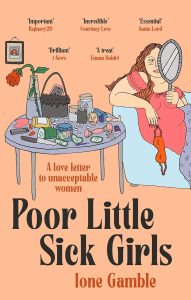Literature
Questioning Art in a Time of War
Questions to Ask Before Your Bat Mitzvah is nominally addressed to Jewish teens in the United States who are preparing for their B’nai Mitzvahs (a gender-neutral rendering of Bat or Bar Mitzvah). It was published in an edition of 3,000 by Wendy’s Subway, an independent Brooklyn publisher, with support from Harvard University and VCU, which places the book squarely within an art-world context. What, if anything, can this politically-oriented book accomplish in an art context that direct activism in organizations like JVP cannot?...
Artists Against Colonels
Joseph Matthews and Evangeline Riddiford Graham chat about using fiction to unravel fascism, and why the “regime of the colonels” found the Greek underground counteroffensive of poetry and music so difficult to control....
Nature, Wild Girls, and Putting History in a New Environmental Perspective
In her latest book, Wild Girls, Harvard historian Tiya Miles is particularly concerned with how the relationship with nature established by several nineteenth-century women—some prominent, some not—helped them flourish outside of conventional gender roles. ...
Beyond Colonialism in a Sentimental Mood
Empires tend to create a rosy picture of the past, conveniently ignoring the atrocities they inflicted. Vuillard avoids this trap, in a witty manner. ...
Seven recommended reads for UK Disability History Month 2023
To mark UK Disability History Month 2023 (16 November to 16 December), members of LSE’s Disability and Wellbeing Staff Network (DAWN) and the wider LSE community recommend seven books about disability and by disabled authors. This selection – covering fiction, memoir, academic writing and poetry – will inform, entertain and inspire readers.
 Some of Us Just Fall. Polly Atkin. Sceptre. 2023.
Some of Us Just Fall. Polly Atkin. Sceptre. 2023.
A raw, moving and poetic memoir of living with chronic illness by Polly Atkin, who was diagnosed with Ehlers-Danlos Syndrome and haemochromatosis in her thirties after years of misdiagnoses, gaslighting and misogyny by the medical profession. Based around the Lake District, Atkin turns to the natural world in search of inspiration for a life lived well with disability, finding both solace and an understanding that nature itself cannot ‘cure all ills’.
Recommended by Helen Flood, Marketing and Project Manager in Consulting at LSE Research and Innovation
 Crippled: Austerity and the Demonisation of Disabled People. Frances Ryan. Verso. 2019.
Crippled: Austerity and the Demonisation of Disabled People. Frances Ryan. Verso. 2019.
From brutal cuts to disability benefits to the indignity and indecency of the means testing system, this book by journalist Frances Ryan offers a devastating indictment of the disproportionate impact of austerity policies on disabled people. It is also, however, a call for action, offering a vision for a society in which disabled people are valued, respected, and supported.
Recommended by Joss Harrison, DAWN Communications Manager and Centre Assistant at LSE’s Phelan US Centre
I Feel Fine. Olivia Muenz. Switchback Books. 2023.
Olivia Muenz’s first book of poetry is a brilliant exploration of language and embodiment, written through her experience of neurodivergence and chronic cognitive fatigue. As they consider ideas of how a brain attempts to make meaning, the poems disarm the reader with disorientating shifts in tone and an interruptive use of punctuation. I would also recommend reading an excerpt from Muenz’s essay “Couch Potato” published in The New England Review (Vol. 44, No. 2 2023) which uses the the titular phrase to explore and challenge representations of the chronically ill body.
Recommended by Anna D’Alton, Managing Editor of the LSE Review of Books Blog
 Poor Little Sick Girls. Ione Gamble. Dialogue Publishing. 2022.
Poor Little Sick Girls. Ione Gamble. Dialogue Publishing. 2022.
Diagnosed with an incurable illness at nineteen, Ione Gamble found herself confined to her bed for up to twenty hours at a time. She began to pick apart our obsession with self-care as perpetuated by social media and celebrity culture, and how it intersects with disability. Gamble’s debut essay collection examines what it means to present as an ‘unacceptable’ woman in the age of Instagram conformity and is the perfect antidote for those who view the wellness industry and girlboss feminism with a healthy dose of scepticism.
Recommended by Helen Flood, Marketing and Project Manager, in Consulting at LSE Research and Innovation
 Parable of the Talents. Octavia Butler. Seven Stories Press. 1998.
Parable of the Talents. Octavia Butler. Seven Stories Press. 1998.
As a dyslexic, Black woman writing in a genre dominated by white men, Octavia Butler was a pioneering writer of science fiction. Her Parable of the Talents, published in 1998, figures alongside The Handmaid’s Tale as a remarkably prescient warning into the dangers of populism and conservative extremism.
Recommended by Joss Harrison, DAWN Communications Manager and Centre Assistant at LSE’s Phelan US Centre
 Strong Female Character by Fern Brady. Brazen. 2023.
Strong Female Character by Fern Brady. Brazen. 2023.
Comedian Fern Brady writes with wit, candour and brutal honesty about growing up with undiagnosed autism (a condition frequently under-diagnosed in women) as she flounders through her early years existing on the edge of understanding. Post-diagnosis, she shares how autism has shaped every area of her life, from friendships and relationships to education and career choices, as well as the danger that comes with trying to match others’ baffling social cues. An enlightening and original voice for anyone seeking to understand autism from the female perspective.
Recommended by Helen Flood, Marketing and Project Manager, in Consulting at LSE Research and Innovation
Activist Affordances argues that we can all create a more habitable planet if we learn from the adaptive ways in which disabled people improvise everyday tasks. Connecting ideas from the fields of ethnography, psychology, disability studies and performance studies, this is an original book that challenges normative, ableist conceptions of activism and environmental protection. You can read a review of it by Kostadin Karavasilev on LSE Review of Books.
Recommended by Anna D’Alton, Managing Editor of the LSE Review of Books Blog
LSE Review of Books thanks all the members of the LSE community who contributed to this reading list with their book recommendations.
Note: This reading list gives the views of the contributors, and not the position of the LSE Review of Books blog, or of the London School of Economics.
The Upside Down: Saint Cuthbert – Wonder Worker
 Newsletter offer
Newsletter offer
Receive our Behind the Headlines email and we'll post a free copy of Byline Times
Three months before my father died, he told me how much he’d enjoyed the novel I’d given him at Christmas. It was called Cuddy by Benjamin Myers, published by Bloomsbury in March, and it has just won the Goldsmiths Prize.
Cuddy is the nickname of Saint Cuthbert, the great saint of north-east England famous for his piety and his miraculous gifts.
For 300 years after his death, his coffin, containing his still undecayed body, went on the run from Viking hordes, carried by successive generations of monks. It was finally interred on a site above a bend in the River Wear. Over him, was raised what became Durham Cathedral, one of the world’s great buildings and the place where my father was ordained in 1968.
It was how he described his response to the book – the last one he finished under his own steam – that has stayed with me.
“I could have been like him,” he told me with childish enthusiasm.
“What, like St Cuthbert?” I laughed.
“Yes,” he said.
“What, living alone on an island surrounded by puffins and terns, eating nothing but raw onions and having your feet warmed by the breath of otters?”
“Why not?” he chuckled.
The exchange reminded me not only of my own admiration for Myers’ brilliant, ambitious novel written, in the author’s own words, “in the long shadow of Saint Cuthbert’s enduring influence”, but of my love for the saint himself – something I shared with my father.
Given the intricate and often frankly unbelievable miracles attributed to many medieval saints, there always seemed something very simple and Christ-like about Cuthbert.
He had started life as a shepherd in the far north of Northumbria and retained a close affinity for nature: he was at his happiest on his island fastness of Inner Farne, where he lived surrounded by thousands of pairs of guillemots, puffins and eider ducks. With his own hands, he built a two-roomed stone house surrounded by a high wall. This meant he could spend much of his time praying outdoors, “with only the sky to look at, so that eyes and thoughts might be kept from wandering and inspired to seek for higher things”.
The Upside Down: Why Our Rituals of Death Need Re-Thinking
John Mitchinson reflects on what he learned about the ‘baffling presence of absence’ when his father died in his arms
John Mitchinson
He was soon inundated by visits from pilgrims. News of the ‘wonder worker of Britain’ had spread and there was a constant stream of visitors asking for healing and counselling. In return, Cuthbert asked only that his uninvited guests respect the local animals and he forbade the hunting of all nesting birds – probably the world’s first piece of wildlife conservation legislation. In his honour, eider ducks are still called ‘Cuddy ducks’.
He was also a remarkably skilful politician.
When he arrived at Lindisfarne in 669, he was given the task of persuading the monks there to accept the authority of Rome, as ordered by the Synod of Whitby in 664. The Synod was a major turning point in the early history of the British church, marking the end of independent Celtic Christianity – a loosely administered, missionary-based religion – introduced into Ireland by St Patrick in the 5th Century and taken to Scotland and northern England by St Columba. Many British monastic institutions (including Lindisfarne) were resistant to the changes.
Cuthbert was the perfect man to make them see the light. He had all the credibility that came from wandering the wilds as a missionary in the Celtic mode but was also a pious and obedient member of a Benedictine monastery, committed to the authority of Rome. The monks deferred to his moral authority and, through his inspiration, the north-east of England became one of Europe’s most influential centres of religious scholarship. The Lindisfarne Gospels, commissioned in his honour, are regarded as the supreme fusion of Anglo-Saxon and Celtic religious art.
Cuthbert spent the last year of his life on his beloved Inner Farne, living on a weekly ration of five raw onions (“whenever my mouth was parched or burned with excessive hunger or thirst I refreshed and cooled myself with these”). This was a return to the simple Celtic faith of his youth and it’s that I think that had so excited my father.
He too had joined a monastic order at 16 and, although by the end of his life, he no longer went to church, that had always been his road less travelled.
I like the idea that reading Cuddy had fired the failing neurons in his brain and connected him with an earlier version of himself. By the end, he didn’t need buildings or music or formal liturgy. He was like Cuthbert, on his own, contemplating an empty sky, feeling the pull of the sea.
As Ben Myers imagines Cuthbert’s final moments:
I am sun and moon and rain.
Tomorrow’s skeleton swathed in silk.
It is where we are all headed.
Helen Schulman in Conversation about Lucky Dogs
Though Lucky Dogs examines both the #MeToo movement and the nature of civil war (between women, between cultures), Schulman is quick to add that Lucky Dogs is also meant to be funny—as in fact the author is herself....
The Humanities As a Theory of Change
At a moment when state auditors are scrutinizing higher education budgets with an eye to trimming humanities majors and offerings out of existence, we’d do well to pause and reflect on the career of the distinguished educator Ruth Simmons....
Helen Schulman’s New Novel Is a Nail-Biter
I was a nail-biter in high school. I stopped when I went to college, embarrassed by what now seemed like a childish lack of control. Last week, Helen Schulman’s new anxiety-inducing novel, Lucky Dogs, made me relapse....

 Activist Affordances: How Disabled People Improvise More Habitable Worlds. Arseli Dokumacı. Duke University Press. 2023.
Activist Affordances: How Disabled People Improvise More Habitable Worlds. Arseli Dokumacı. Duke University Press. 2023.